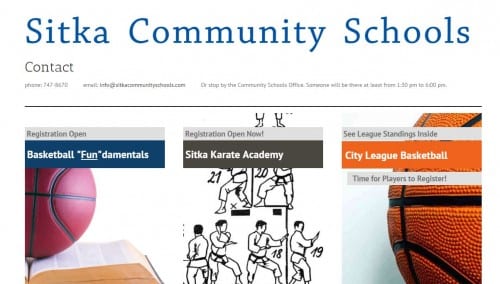
The future of Sitka’s Community Schools is uncertain, now that the contractor who manages the after-school program has announced he’s closing down at the end of the month. And while no one’s offered to replace him, the school district hopes to find a way to keep the program going past July 1.
Note: The Sitka School Board will take up the issue of the Community Schools contract at its next regular meeting on June 19.

Matthew Turner has operated Community Schools in Sitka since 2015. His current contract ends on June 30, and the district’s latest offer of $25,000 does not interest him.
“I can’t do it for that,” Turner said. “There’s so much risk involved.”
For each of the last four years Turner has been paid $100,000 to manage Community Schools. His insurance bill is $25,000 which comes right off the top.
“The remaining $75,000 of that I considered my salary — which seems pretty good — but let’s not forget that 22-percent of that is taxes,” said Turner. “So that brings me down to about $60,000, without any benefits. So once I’ve paid for my health insurance and stuff, that’s what I consider my salary.”
Turner has seven part-time employees who are paid out of revenues the program generates running weekly activities like Skate Night and Vintage Basketball, managing ongoing leagues for basketball and volleyball, and providing space for clubs like the Baranof Ballers, Tsunami Wrestling, and three seasons of youth soccer (which is organizing as an independent activity).
By cutting down the contract from $100,000 to $25,000 the Sitka School Board knows it is shifting costs onto the users of Community Schools, who typically pay around $4 for an activity. Turner says that fee would likely jump to $8, and have a chilling effect on participation.
Putting Community Schools into a pay-to-play model is deterring Turner from submitting a new proposal, and he believes it will deter others as well.
“If not enough people sign up for city league basketball, then I won’t be able to make enough money to live,” Turner said.
So, he’s pulling the plug. Turner posted on the Community Schools Facebook page on June 4 that he was closing down as of June 30.
“It’s not exactly correct that it will completely end,” said Mary Wegner, Sitka’s superintendent of schools.
Wegner confirms that no one has put in a proposal on the $25,000 Community Schools contract, but she has had some nibbles. If the district receives no offers by the June 13 deadline, Wegner says she’ll be ready to deal.
“Plan B is that I would reach out and contact the nibblers and see if they’d be interested in putting in a proposal for consideration,” said Wegner. “Just not through the formal RFP (Request for Proposals) process.”
Wegner says that’s how the district arrived at a contract with Turner four years ago. And it’s similar to how the district handles other contracts like buses and food service.
In an interview with KCAW, Wegner said she’s not expecting any interruption in Community Schools programs.
KCAW – If you did get a favorable response to the RFP, when would Community Schools be up-and-running again?
Wegner – July 1.
Matthew Turner has nothing but sympathy for the school board, as it navigates this year’s tense budget politics. He knows that the $100,000 the district formerly paid for Community Schools represents one teacher’s salary — so he’s not surprised that the program lost out to educational priorities. But he also believes there’s more at stake with Community Schools than people realize.
“The same arguments happened with the library, when we were talking about reducing hours in the library,” said Turner. “The library ain’t just about books: It’s about having a safe, public space where people can go and be safe and warm and dry. And in much the same way, we don’t have an open-to-all youth center in our community. But Blatchley Middle School commons area became one whenever I was in business.”
Turner thinks that equity and access are both important discussions to have around Community Schools — perhaps at the assembly table, rather than at the School Board.






























